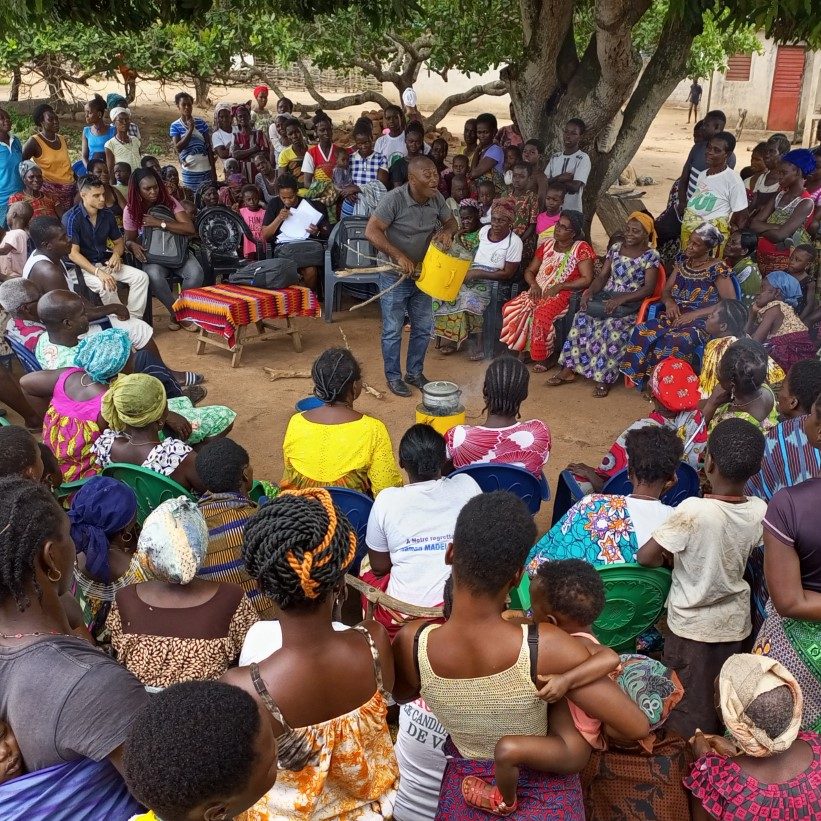To improve the living conditions of families and reduce the carbon footprint, we have started the distribution of improved cookstoves.
100.000 clean cook stoves to reduce energy poverty and fight deforestation
In June 2022, AVSI Ivory Coast in partnership with Eni Côte d’Ivoire, launched a project to promote the adoption of improved cookstoves among the most vulnerable rural communities in Ivory Coast through the distribution of 100,000 cookstoves in six years, starting from 2022, reaching over 500,000 people.
As an alternative to traditional cooking methods, such as the “three-stone fire”, these new systems, powered by wood or charcoal, are designed with a high thermal efficiency that allows significant savings of biomass fuel, consequently reducing greenhouse gas and combustion emissions, which represent a serious health hazard. The improved cookstoves distributed by AVSI and Eni are 100% produced in Ivory Coast by a local company; in fact, the project sets out to support the growth of a production chain in the country, fostering the transition towards more sustainable energy sources.
At the core of the initiative is the progressive raising of awareness among families towards the adoption of these cooking systems, which have less impact on health and the environment. Therefore, in addition to the production and distribution of cookstoves, the nurturing of relationships with the villages and the communities and the assistance provided to individual families are crucial elements of the work of the operators involved.
The improved cookstoves bring benefits for health as well as reducing the time it currently takes to collect the fuel and prepare the meals, activities which are a significant burden on women’s everyday lives. They also represent a way of fighting deforestation as their thermal efficiency allows to reduce the amount of woody biomass consumed for cooking by up to 60%.
Deforestation is a major concern in the country: in the past sixty years, over 90% of the forests have disappeared, making Ivory Coast one of the African countries with the highest annual deforestation rate.
We contribute to compensating the emissions of the Baleine project
By virtue of the environmental benefits induced by these improved cookstoves, we can also generate carbon credits which will be certified through the international standard VERRA. The project will generate approximately 1 million VCUs (Verified Carbon Units) over the next 10 years, which will contribute to compensating the Scope 1 and Scope 2 emissions of the Oil & Gas business project Baleine, which will be the first Net Zero development in the African continent. This initiative is therefore a concrete example of aligning our decarbonisation strategy with the country’s local development goals, as it sits at the intersection between environmental sustainability and local development, on one hand reducing the harmful emissions linked to domestic tasks and the impact on forestry resources and on the other contributing to the improvement of subsistence means and living conditions of vulnerable local communities.
The significant savings offered by the improved cookstoves give these families the chance to rethink the use of their time, acting as a driver for development of the whole family group.
Vincenzo Gangone, Project Manager AVSI
Sustainable Development Goals (SDGs)
The Agenda 2030 for Sustainable Development is an action programme signed in September 2015 by 193 UN member states, involving 17 goals supporting the socio-economic development of communities and territories. Through the distribution of improved cookstoves, we will contribute to the achievement of the following goals:
- SDG 1 (families can experience a reduction of the expenditures for the purchase of wood and/or charcoal, with a positive impact on domestic finances)
- SDG 3 (exposure to combustion fumes and pollutants will be reduced, contributing to a reduction in the incidence of respiratory diseases, a leading cause of death, especially among children and women)
- SDG 5 (women can significantly reduce the time they normally spend collecting wood and cooking food)
- SDG 7 (we promote the adoption of cleaner and more affordable cooking solutions. These improved cookstoves have more than twice the thermal efficiency of conventional cooking methods and allow families to significantly reduce the amount of biomass consumed)
- SDG 8 (through the local production and distribution of improved cookstoves, we support the development of a local value chain, increasing the number of users of this technology and potential new customers, with a positive impact on the local economic fabric)
- SDG 13 (we contribute to reducing greenhouse gas emissions and fighting deforestation).
Partnership
This initiative has seen the involvement, of the Ivorian Governmen, the local manufacturer of improved cookstoves Green Ker and VERRA, the US organisation that sets the reporting and monitoring requirements to quantify the reduction of carbon emissions and checks, validates and certifies the carbon credits associated with the use of the cookstoves.
The collaboration with Eni allowed us to drastically increase our production capacity through the purchase of new machinery and equipment. We have also been able to increase our employees’ salaries and improve the working environment.
Ermann Zannou, manufacturer of improved cookstoves (Green Ker)
Impact on local content
Replacing the traditional cooking systems carries numerous social and environmental benefits to the country. In particular, it is important to highlight the impact on the local content. These cookstoves are in fact all produced locally in a workshop in the city of Abidjan, recognized by the Clean Cooking Alliance; therefore, we are actively supporting businesses and workforce in Ivory Coast. Moreover, the implementation project employs over 40 local resources.










